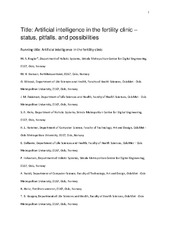Blar i forfatter Artikler, rapporter og annet (informatikk) "Hammer, Hugo Lewi"
-
Approximate Bayesian Inference Based on Expected Evaluations
Hammer, Hugo Lewi; Riegler, Michael (Journal article; Tidsskriftartikkel; Peer reviewed, 2023-02-01)Approximate Bayesian computing (ABC) and Bayesian Synthetic likelihood (BSL) are two popular families of methods to evaluate the posterior distribution when the likelihood function is not available or tractable. For existing variants of ABC and BSL, the focus is usually first put on the simulation algorithm, and after that the form of the resulting approximate posterior distribution comes as a ... -
Artificial intelligence in dry eye disease
Storås, Andrea Marheim; Strumke, Inga; Riegler, Michael Alexander; Grauslund, Jakob; Hammer, Hugo Lewi; Yazidi, Anis; Halvorsen, Pål; Gundersen, Kjell Gunnar; Utheim, Tor Paaske; Jackson, Catherine Joan (Journal article; Tidsskriftartikkel, 2021-11-27)Dry eye disease (DED) has a prevalence of between 5 and 50%, depending on the diagnostic criteria used and population under study. However, it remains one of the most underdiagnosed and undertreated conditions in ophthalmology. Many tests used in the diagnosis of DED rely on an experienced observer for image interpretation, which may be considered subjective and result in variation in diagnosis. ... -
Artificial intelligence in the fertility clinic: status, pitfalls and possibilities
Riegler, Michael Alexander; Stensen, Mette Haug; Witczak, Oliwia; Andersen, Jorunn Marie; Hicks, Steven; Hammer, Hugo Lewi; Delbarre, Erwan; Halvorsen, Pål; Yazidi, Anis; Holst, Nicolai; Haugen, Trine B. (Journal article; Tidsskriftartikkel; Peer reviewed, 2021-07-29)In recent years, the amount of data produced in the field of ART has increased exponentially. The diversity of data is large, ranging from videos to tabular data. At the same time, artificial intelligence (AI) is progressively used in medical practice and may become a promising tool to improve success rates with ART. AI models may compensate for the lack of objectivity in several critical procedures ... -
Automatic Unsupervised Clustering of Videos of the Intracytoplasmic Sperm Injection (ICSI) Procedure
Storås, Andrea; Riegler, Michael Alexander; Haugen, Trine B.; Thambawita, Vajira L B; Hicks, Steven Alexander; Hammer, Hugo Lewi; Kakulavarapu, Radhika; Halvorsen, Pål; Stensen, Mette Haug (Chapter; Bokkapittel, 2023-02-02)The in vitro fertilization procedure called intracytoplasmic sperm injection can be used to help fertilize an egg by injecting a single sperm cell directly into the cytoplasm of the egg. In order to evaluate, refine and improve the method in the fertility clinic, the procedure is usually observed at the clinic. Alternatively, a video of the procedure can be examined and labeled in a time-consuming ... -
A Deep Diagnostic Framework Using Explainable Artificial Intelligence and Clustering
Thunold, Håvard Horgen; Riegler, Michael; Yazidi, Anis; Hammer, Hugo Lewi (Journal article; Tidsskriftartikkel; Peer reviewed, 2023-11-09)An important part of diagnostics is to gain insight into properties that characterize a disease. Machine learning has been used for this purpose, for instance, to identify biomarkers in genomics. However, when patient data are presented as images, identifying properties that characterize a disease becomes far more challenging. A common strategy involves extracting features from the images and ... -
Deep Tower Networks for Efficient Temperature Forecasting from Multiple Data Sources
Eide, Siri Sofie; Riegler, Michael; Hammer, Hugo Lewi; Bremnes, John Bjørnar (Journal article; Tidsskriftartikkel; Peer reviewed, 2022-04-06)Many data related problems involve handling multiple data streams of different types at the same time. These problems are both complex and challenging, and researchers often end up using only one modality or combining them via a late fusion based approach. To tackle this challenge, we develop and investigate the usefulness of a novel deep learning method called tower networks. This method is able ... -
Efficient quantile tracking using an oracle
Hammer, Hugo Lewi; Yazidi, Anis; Riegler, Michael; Rue, Håvard (Journal article; Tidsskriftartikkel; Peer reviewed, 2022-04-14)Concept drift is a well-known issue that arises when working with data streams. In this paper, we present a procedure that allows a quantile tracking procedure to cope with concept drift. We suggest using expected quantile loss, a popular loss function in quantile regression, to monitor the quantile tracking error, which, in turn, is used to efficiently adapt to concept drift. The suggested ... -
HyperKvasir, a comprehensive multi-class image and video dataset for gastrointestinal endoscopy
Borgli, Hanna; Thambawita, Vajira; Smedsrud, Pia H; Hicks, Steven; Jha, Debesh; Eskeland, Sigrun Losada; Randel, Kristin Ranheim; Pogorelov, Konstantin; Lux, Mathias; Dang Nguyen, Duc Tien; Johansen, Dag; Griwodz, Carsten; Stensland, Håkon Kvale; Garcia-Ceja, Enrique; Schmidt, Peter T; Hammer, Hugo Lewi; Riegler, Michael; Halvorsen, Pål; de Lange, Thomas (Journal article; Tidsskriftartikkel; Peer reviewed, 2020-08-28)Artificial intelligence is currently a hot topic in medicine. However, medical data is often sparse and hard to obtain due to legal restrictions and lack of medical personnel for the cumbersome and tedious process to manually label training data. These constraints make it difficult to develop systems for automatic analysis, like detecting disease or other lesions. In this respect, this article ... -
ML-Peaks: Chip-seq peak detection pipeline using machine learning techniques
Sheshkal, Sajad Amouei; Riegler, Michael; Hammer, Hugo Lewi (Chapter; Bokkapittel, 2023-07-17)CHIP-Seq data is critical for identifying the locations where proteins bind to DNA, offering valuable insights into disease molecular mechanisms and potential therapeutic targets. However, identifying regions of protein binding, or peaks, in CHIP-seq data can be challenging due to limitations in peak detection methods. Current computational tools often require manual human inspection using data ... -
Unraveling the Impact of Land Cover Changes on Climate Using Machine Learning and Explainable Artificial Intelligence
Kolevatova, Anastasiia; Riegler, Michael; Cherubini, Francesco; Hu, Xiangping; Hammer, Hugo Lewi (Journal article; Tidsskriftartikkel; Peer reviewed, 2021-10-15)A general issue in climate science is the handling of big data and running complex and computationally heavy simulations. In this paper, we explore the potential of using machine learning (ML) to spare computational time and optimize data usage. The paper analyzes the effects of changes in land cover (LC), such as deforestation or urbanization, on local climate. Along with green house gas emission, ...


 English
English norsk
norsk








